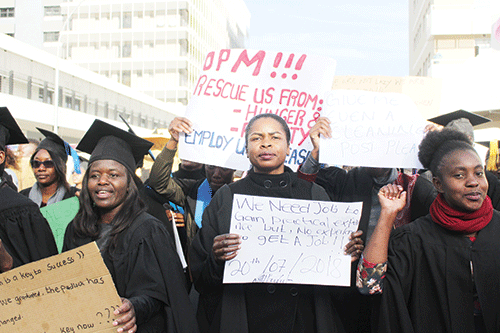As this year’s Presidential and National Assembly elections beckon, bankable solutions to Namibia’s youth unemployment crisis could decide who wins.
Ultimately, this might result in a mutual win for political parties and the youth.
“By leveraging their collective voting power, the youth have the potential to steer political discourse towards policies that prioritise job-creation, skills development and sustainable growth.
May the youth decide at the polls whether the 2024 ballot is for jobs,” said a research associate from the Institute for Public Policy Research (IPPR), Rosevitha Ndumbu.
A total number of 700 648 young people, representing 52% of the voters on the final list, registered themselves as voters in 2019.
Analysis revealed that 403 106, representing 30% of registered voters were ‘born-frees’, young people born after independence in 1990.
Bread-and-butter issues, like in any election, inevitably emerge, and have a significant impact on the outcome.
In a study released last month, Ndumbu said the pervasive problem of youth unemployment cannot be overstated.
This is an area that needs urgent intervention, for continued national peace and stability.
At the same time, she emphasised that there is an undeniable call for action for the youth to take full advantage of civic and political avenues to make their voices and priorities heard.
“With a bleak future, one would expect that young people would be at the forefront of exercising their democratic right to vote in order to ensure they elect people who they believe can adequately address their concerns,” Ndumbu stated.
The researcher is of the view that the nation finds itself at a proverbial crossroads, where employment aspirations of the youth cuts right through the heart of democracy.
Most Namibian youth currently face insurmountable obstacles in an economy with staggeringly high unemployment, with little to no room to manoeuvre.
The most recent Labour Force Survey, issued in 2018, found that unemployment among the country’s youth was a shocking 46.1%.
With the impact of Covid-19 which decimated lives and livelihoods, it is projected that the situation has only worsened.
Over the years, political authorities have often warned that the youth unemployment crisis might spark societal upheaval, and a demonstration against unemployment by discontented youth on Namibia’s Independence Day in 2023 is a prime example of this.
Preliminary results from the 2023 Population and Housing Census show that the youth population constitutes about 71.1% of the total population of about three million.
Meanwhile, independent economic researcher Josef Sheehama said it is important to realise that voting can influence the political party in power, and promote change which benefits the youth.
He added that it is primarily up to the youth to ensure a better future.
“By using their right to vote, young people can make sure their opinions are heard, influence policy decisions, and speak up for their needs,” the researcher observed.
Sheehama believes young people can directly influence policies and decisions made by elected leaders by registering to vote.
He pointed out that voters have an impact on how their country and local communities develop in the future.
Sheehama said youth engagement draws lawmakers to youth-related issues, and highlights the importance of youth viewpoints.
On the other hand, it is imperative to ensure there is an understanding of why young people do not vote, since one of the factors influencing the youth’s low voter turnout is low political literacy.
“I urge young people to vote because they have the ability to change the political landscape. In addition, young people should mobilise their peers in their communities and on social media platforms in order to advance the youth agenda,” he urged.
Caleb Majooka, a recent university graduate, said elections are extremely significant as they allow young people to decide the future of politics, economics and unemployment.
“This is the time for the youth to make decisions, and elect other young people to drive their agenda. It is time for young people to take the lead. It is no secret that there is high unemployment. Therefore, we must choose wisely. Many of the country’s problems can only be solved if we vote for candidates whom we believe can turn around the situation,” said Majooka.
On its part, the Electoral Commission of Namibia reckons that voter apathy, especially among the youth, remains a challenge. It is thus imperative that all stakeholders are actively engaged in the provision of both civic and voter education activities.
However, in the official announcement statement of the final election results for the 2019 Presidential and National Assembly elections, then-ECN chairperson Notemba Tjipueja noted that young people showed interest in voting that year.



